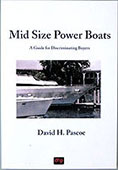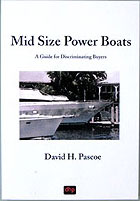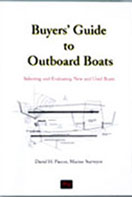Your First Boat
Part III
by David Pascoe
In part II, we made the recommendation that an used boat offers excellent value and good prospects for reliability. But how old of a boat? And how do you go about completing a deal?
Our experience indicates that boats in the 2-4 year old range usually offer the best prospects. Of course, boats that are only one year old are hard to find since not many people sell at that age. Secondly, you have to ask yourself why would someone get rid of a boat that is only a year old? The reason could be financial distress, but you also have to wonder if they're getting rid of it because it is a turkey.
This is a common problem with cars, and one of the primary reasons why the owner of a year old car decides to get rid of it-- usually because it has had a train of problems that just wouldn't quit, so he decides to dump it. I should know, because I'm the proud owner of just such a vehicle.
Therefore, my suggestion is to look in the two to four year old range, particularly since prices will drop dramatically at this age. Whereas the seller of a year old boat is still thinking about the high balance on his loan and may be trying to recover that amount when the boat is not really worth that.
By Owner or Dealer The better deals are to be found through direct owner sales. Yes, it may be easier to buy through a dealer because they will handle everything, but you are going to pay for that service in terms of higher prices and probably higher financing charges.
Making a direct purchase from an owner is usually a simple and reasonably painless process if you follow these steps:
Appraisals As much as I dislike used boat price guides, the fact is that these books usually determine the amount a lender will finance, so you'd best check the book value first. Rest assured that these books do no always accurately reflect the actual selling prices of boats. The way to get a good handle on prices is to clip ads and search the Internet. Make a list all similar boats you can find, noting their power and other options, plus the asking price. I usually do this on a legal pad. Then I deduct 10% to 15% of the asking price to get an idea of what I think it will really sell for. To calculate an average price, be sure to throw out prices that are unusually high or low, as these will skew the average.
For a boat in the $10k to $20K range, the deduction amount is 10%. For boats over $30k the actual selling will be closer to 15% less, so use that amount. For boats under $5K the amount will be around 5%. This is based on the fact that the lower the amount, the more people tend to set the price at what they actually intend to sell for. The higher the price, the bigger their dreams.
Financing Before boat shopping, it's best to get your line of credit set up first. Know what your lender is going to limit you to in advance. When dealing with private sellers, it's best to streamline the process as much as possible. When making a purchase of over $10K, we recommend that you create a purchase agreement. A standardized form is not necessary, You type one up yourself, or even hand write one. It's every bit as legal as a printed version. What should it include? All the things that you agree upon with the seller, including the price, any conditions of sale, and most importantly, the date on which the sale must be closed by. If you're going to have the boat surveyed -- and you should-- then that should be included too, as "Subject to survey".
Will the sale be "as is" or does the seller agree to fix anything that is wrong? Include this also.
Warranties Check on whether there is a warranty and whether it is transferable. Get a copy from the seller and read it. If the boat is being brokered or sold by a Dealer, DO NOT TAKE THE DEALER"S WORD ABOUT WARRANTIES. Read it yourself, as dull as that may be.
Deposits The owner has a right to ask for a cash deposit at the time you sign a purchase agreement.10% is customary from dealers and brokers, but direct sellers usually ask for less. Include the deposit amount in the sales agreement, and the fact that it will be refunded should serious problems crop up from the survey.
Titles You should never buy a boat that doesn't have a title. NEVER. If the boat doesn't have one, look for another boat. Look at the title before you make a cash deposit. In most states you can verify the title though the appropriate titling agency with just a phone call, so be sure to record the title number and owner name and address. You want to be on the lookout for things like multiple owners, such as husband and wife. It's a good idea to check on whether the seller is in the middle of a divorce and that the spouse will sign off on the title. Sometimes there is a property dispute and you don't want to get caught up in that.
Trailers The same applies here. These are titled and licensed vehicles so you will want to make sure that all is in order with its title.
Beyond the Glitz and Glitter

















David Pascoe is a second generation marine surveyor in his family who began his surveying career at age 16 as an apprentice in 1965 as the era of wooden boats was drawing to a close.
Certified by the National Association of Marine Surveyors in 1972, he has conducted over 5,000 pre purchase surveys in addition to having conducted hundreds of boating accident investigations, including fires, sinkings, hull failures and machinery failure analysis.
Over forty years of knowledge and experience are brought to bear in following books. David Pascoe is the author of:
In addition to readers in the United States, boaters and boat industry professionals worldwide from nearly 80 countries have purchased David Pascoe's books, since introduction of his first book in 2001.
In 2012, David Pascoe has retired from marine surveying business at age 65.
On November 23rd, 2018, David Pascoe has passed away at age 71.
Biography - Long version